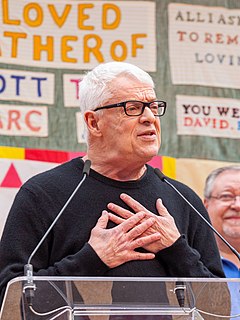A Quote by Amartya Sen
The understanding that women are not inferior across the world, it's something that you can get from school, not only from the book but also from chatting with other kids. It's a big impact. One of the curious things is that even when - and this we found from studies - the schools are doing pretty badly in terms of their education, about mathematics and literature and language, going to school transformed people because I think the action of schooling, the activity, is very important.
Quote Topics
About
Across
Action
Activity
Also
Badly
Because
Big
Big Impact
Book
Chatting
Curious
Doing
Education
Even
Found
Get
Going
Impact
Important
Inferior
Kids
Language
Literature
Mathematics
Only
Other
Other Kids
People
Pretty
School
Schooling
Schools
Something
Studies
Terms
Things
Think
Transformed
Understanding
Very
Women
Women Are
World
Related Quotes
One of the things that any kind of studies bring out is that the mere act of schooling - getting together, the organization involved, going to classes on time, and there're things being taught, sitting down with others with different backgrounds, chatting with them, and, sometimes when there are big barriers, eating together when there are school meals, which are big things together with a big social impact - they themselves have a major effect.
When I was in Wuhan, I went to the art school, which was one of the most important art schools in China, an enormous art school. One of the things that I saw is that the schools are very big and there are so many students. It is very difficult to me to teach creative activity to great numbers of people, because I think you need personal contact with students, you need to speak individually, you need individual contact between teachers and students, you need continuity. To me this is a problem in mass education in every society now.
In some big cities [in Pakistan] some women have access to a job and education - but the UN reported that more than 5 million girls cannot go to school. It's become an open secret. In some big cities they build schools to deceive people around the world, while the level of education remains very low, and even when they can go to school there is no security.
It's hard sometimes when you're in a regular high school, you just feel like the odd kid out. The great thing about going to an art school [is] it's kind of like it's all the odd kids. It's all the kids that don't fit in at their regular schools, because you're into something and excited about something that other kids really aren't into. When you go to art school, everybody's kind of on the same page.
Reading is always a way of forming a bond with other people. I'm not very good at socializing - I quite like spending time alone - so reading is a way of engaging quite deeply with the way other people think. Quite often when you meet other people socially you don't get to have a conversation of any depth. You end up talking about how well or how badly someone is doing at school or something of that sort. Questions like, "What we are," "Who we are," "Where are we going," you get those from literature and from people that spend some time thinking.
I did one year of school and I was doing correspondence school, which was actually another happy accident. Correspondence school is basically home school, but you teach yourself instead of your parents teaching you. I found that to be one of the most important things in my life is that I learned how to teach myself things. I feel like that's something that schools should actually teach.
A mathematician either has a feeling for equations and an understanding and delight in it, not only in the purity of it, but in its beauty as well. I don't think that's something that you learn at school. I think you can get better in mathematics on a school level, but when you're talking about being a mathematician, I think that's definitely a gift of genes or whatever, you know? Whatever your pool is.
It's really important to say this. Often the faith schools were founded before the state provided education. I want good education in this country so I'm not going to slag off faith schools. I think that it's important that people of different backgrounds and different faiths go to school together and many faith schools do that.
We are human behind and this part of our human nature that we don't learn the importance of anything until it's snatched from our hands. In Pakistan, when we were stopped from going to school, and that time I realized that education is very important, and education is the power for women. And that's why the terrorists are afraid of education. They do not want women to get education because then women will become more powerful.
In Afghanistan, there have been a lot of teachers assassinated, schools are being blown up, girls are harassed and in some cases, attacked on their way to school. Even if the girls are able to get an education, they can dream big, they can think about how they want to become a member of parliament because they are now women members of parliament in Afghanistan, nobody is really sure how long everything is going to last.
I've found that when I was young, all the pretty girls at school got all the dates and went to all the big parties and everything because they were pretty. They never bothered to develop anything. And as they aged, their prettiness faded and they were left as middle-aged women who were very, very unhappy and disappointed. But I can't feel sorry for them because that was their own doing.
I don't think there is any scientific evidence about the question of whether we think only in language or not. But introspection indicates pretty clearly that we don't think in language necessarily. We also think in visual images, we think in terms of situations and events, and so on, and many times we can't even express in words what the content of our thinking is. And even if we are able to express it in words, it is a common experience to say something and then to recognize that it is not what we meant, that it is something else.







































